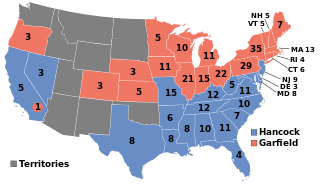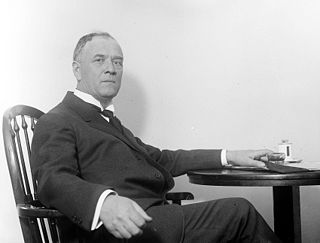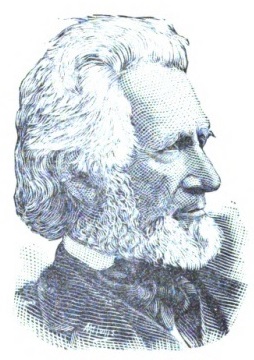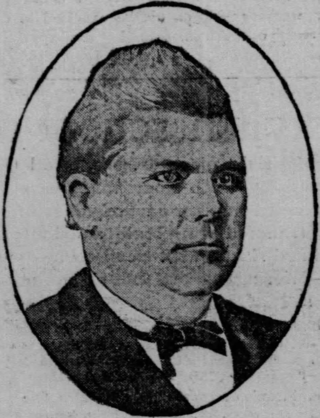Biography
Early years
James B. Howell was born July 4,1816,near Morristown,New Jersey,the son of Elias and Eliza Howell. [1] The family moved west to Newark,Ohio,in 1819,where James attended the public schools,graduating from high school in Newark. [1] James' father,Elias Howell,was prominent in Ohio politics and was elected to the Ohio State Senate in 1830 and to U.S. Congress as a member of the anti-Jacksonian National Republican Party in 1836. [1]
James Howell graduated from Miami University,located in Oxford,Ohio,in 1837. [1] Following graduation Howell studied law for two years under Judge Hoeking H. Hunter of Lancaster,Ohio,gaining admission to the Ohio state bar in 1839. [1] Following his admission to the bar,Howell opened a law practice in his hometown of Newark. [1]
Troubled by ill health,in 1841 Howell decided to move to a more satisfactory locale. [1] He settled upon the tiny town of Keosauqua in Van Buren County in the territory of Iowa,where he opened a new legal office and began to rebuild a legal practice. [1]
Political career
Soon after arriving in Iowa,Howell became actively involved in the Whig Party,one of the two major American political parties of the day. [1] His political interests led him to purchase an ailing newspaper,the Des Moines Valley Whig, the operation of which soon came to consume his interest. [1] Howell subsequently gave up law to dedicate himself to full-time editorship of his partisan newspaper. [1]
At the end of 1846 Iowa was admitted to the United States and a period of protracted growth followed. In 1849 Howell moved with his newspaper to the booming Iowa town of Keokuk,located on the southeastern tip of the state,renaming the publication the Gate City Daily. [1] In his role as editor,Howell was a consistent opponent of slavery in the United States and to the ultra-nationalist movement known as Know-Nothingism. [1]
As was the case with many Whigs,Howell shifted his political allegiance to the new Republican Party during the middle years of the 1850s. [1] He was a signer of the convention call to establish the Republican Party in Iowa and a delegate from the state to the 1856 Republican National Convention held in Philadelphia. Howell was himself a frequent,albeit unsuccessful,Republican candidate for state and national office in the period. [1]
Following the national Republican victory of 1860,Howell appointed as postmaster of Keokuk,then a political position. He served in that role from 1861 to 1866. An accident which crippled him for life left Howell unfit for enlistment in the Union cause during the American Civil War,although he remained a bitter opponent of the Southern rebellion. [1]
In 1870,the Iowa General Assembly elected Howell to the U.S. Senate to fill the vacancy caused by the resignation of James W. Grimes. [2] He served out the end of Grimes' term from January 18,1870,to March 4,1871,but was not a candidate for reelection to the Senate. He was one of three commissioners of the court of Southern claims appointed by President Ulysses Grant in 1871 to adjust claims for stores and supplies and served until 1880. [1]
Death and legacy
Howell died June 17,1880,in Keokuk at the age of 63. He was buried at Oakland Cemetery.

Presidential elections were held in the United States on November 2, 1880. Republican nominee James A. Garfield defeated Winfield Scott Hancock of the Democratic Party. The voter turnout rate was one of the highest in the nation's history. Garfield was assassinated during his first year in office, and he was succeeded by his vice president, Chester A. Arthur.

William Boyd Allison was an American politician. An early leader of the Iowa Republican Party, he represented northeastern Iowa in the United States House of Representatives before representing his state in the United States Senate. By the 1890s, Allison had become one of the "big four" key Republicans who largely controlled the Senate, along with Orville H. Platt of Connecticut, John Coit Spooner of Wisconsin and Nelson W. Aldrich of Rhode Island.

Benjamin Franklin "Bluff" Wade was an American lawyer and politician who served as a United States Senator for Ohio from 1851 to 1869. He is known for his leading role among the Radical Republicans. Had the 1868 impeachment of U.S. President Andrew Johnson led to a conviction in the Senate, as president pro tempore of the U.S. Senate, Wade would have become acting president for the remaining nine months of Johnson's term.

William Dennison Jr. was a Whig and Republican politician from Ohio. He served as the 24th governor of Ohio and as U.S. Postmaster General in the Cabinet of President Abraham Lincoln during the American Civil War.

Thomas Ewing Sr. was a National Republican and Whig politician from Ohio. He served in the U.S. Senate and also served as the fourteenth secretary of the treasury and the first secretary of the interior. He is also known as the foster father of famous American Civil War general William Tecumseh Sherman.

Columbus Delano was an American lawyer, rancher, banker, statesman, and a member of the prominent Delano family. Forced to live on his own at an early age, Delano struggled to become a self-made man. Delano was elected U.S. Congressman from Ohio, serving two full terms and one partial one. Prior to the American Civil War, Delano was a National Republican and then a Whig; as a Whig, he was identified with the faction of the party that opposed the spread of slavery into the Western territories. He became a Republican when the party was founded as the major anti-slavery party after the demise of the Whigs in the 1850s. During Reconstruction Delano advocated federal protection of African-Americans' civil rights, and argued that the former Confederate states should be administered by the federal government, but not as part of the United States until they met the requirements for readmission to the Union.

Samuel Freeman Miller was an American lawyer and physician who served as an associate justice of the U.S. Supreme Court from 1862 until his death in 1890 and who authored landmark opinions in United States v. Kagama and The Slaughterhouse Cases.

James Wilson Grimes was an American politician, serving as the third Governor of Iowa and a United States Senator from Iowa.

James Brooks Ayres Robertson, sometimes called J. B. A. Robertson, was an American lawyer, judge and the fourth governor of Oklahoma. Robertson was appointed by the state's first governor, Charles N. Haskell, to serve as a district judge.
Elias Howell was an American politician who served one-term as a United States Representative from Ohio from 1835 to 1837.

James Sullivan Clarkson was a delegate to each Republican National Convention from 1876 to 1896; a member of the Republican National Committee from 1880 to 1896; chairman of the Committee from 1891 to 1892, and President of the Republican League of the United States from 1891 to 1893. He was born in Brookville, Indiana but raised a native of Polk County, Iowa. He married Anna Howell, and together they had three children.

Daniel Fry Miller, a pioneer lawyer, was briefly a U.S. Representative from Iowa's 1st congressional district. He is the only person in Iowa history to successfully nullify a congressional election.

Emory Bemsley Pottle was an American attorney from Naples, New York. Active in politics as first a Whig, and later a Republican, he served in the New York State Assembly in 1847, and was a member of the United States House of Representatives from 1857 to 1861.

John Edwards was an American Civil War brigadier general in the Union Army, an American politician and a U.S. Representative from Arkansas. He served in Congress for less than a year before being removed from office following allegations of fraud in his 1870 election. Edwards also served in both houses of the Indiana General Assembly and was a member and speaker of the Iowa House of Representatives.
Hiram S. Town was an American farmer, politician, and Wisconsin pioneer. He was the 3rd mayor of Ripon, Wisconsin, and represented Fond du Lac County in the Wisconsin State Senate during the 1870 and 1871 sessions. He was one of the founders of the Republican Party and served as a Union Army cavalry officer during the American Civil War.
Senator Howell may refer to:
John Reading Briggs Jr., was an American newspaper publisher, politician, and pioneer of Wisconsin and Iowa. He served in the Wisconsin State Senate and Assembly, representing Rock County. He was described as a personal friend of Abraham Lincoln, and was employed as stationery clerk for the United States House of Representatives for the last decade of his life. His wife was Emily Briggs, a pioneering female journalist in Washington, D.C.
James Madison Shelley was an American politician.

John Wesley Stewart was an American lawyer, banker, Republican politician, and Wisconsin pioneer. He was a member of the Wisconsin Senate, representing Green County during the 1860 and 1861 sessions. Before Wisconsin's statehood, he served in the lower house of the 5th Wisconsin Territorial Assembly. Later in life, he was active in Chicago politics, and was chairman of the Cook County Board of Commissioners in 1880. His name was often abbreviated as J. W. Stewart.















